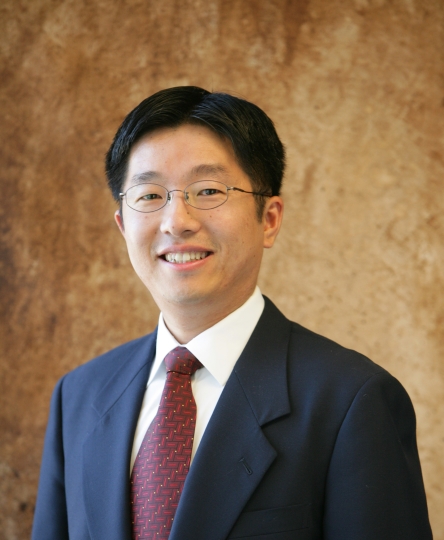Teng Li learned many lessons during his Ph.D. program at the Harvard John A. Paulson School of Engineering and Applied Sciences (SEAS). There were the materials science and mechanical engineering courses at the heart of his engineering science degree, of course, but Li also absorbed the scientific philosophy and pedagogical approach of his many mentors and advisors.
Teng Li, Ph.D. ’06
He puts that approach into practice every day as Keystone Professor of Mechanical Engineering at the University of Maryland’s A. James Clark School of Engineering. His group, the Laboratory for Advanced Sustainable Materials and Technology, conducts groundbreaking research into transforming wood into a material much stronger and lighter than most metals and alloys, and sharper than stainless steel table utensils.
“I always try to keep my mind open to new challenges,” Li said. “I like looking into scientific problems and solving societal challenges. Mentoring and cultivating young minds is something that gives me quite a lot of pleasure and makes me feel fulfilled along the way.”
Li, Ph.D. ’06, arrived at Harvard with a bachelor’s degree from Tsinghua University in Beijing and master’s in materials science from Princeton University. His advisors at Princeton included Zhigang Suo, who became the Allen E. and Marilyn M. Puckett Professor of Mechanics and Materials at SEAS in 2003, and Li joined his mentor in Cambridge a year later.
Suo wasn’t the only Harvard professor to leave a lasting impact on Li. John Hutchinson, James Rice, Frans Spaepen, George Whitesides, David Weitz each taught Li something invaluable that he’d take into his own career in academia. He remembers many days in which he would have engineering classes in one building, then cross Harvard Yard to attend a chemistry seminar, then go to another building to sit in on an open applied physics discussion.
“Multidisciplinary collaboration is the best way to identify new problems, and more importantly identify solutions,” he said. “If you’re interested, you’ll be able to expose yourself to different problems, different people with different backgrounds, and different research interests. I think that’s very important, and along the way you see how those advisors are with their students, so you see different mentoring styles as well.”
That collaborative environment helped Li realize he wanted to pursue academia as a career. He was appointed an assistant professor at Maryland in 2006 and promoted to the Keystone professor in 2012.
“You have to apply for funding, identify new problems, train students and go to conferences, but I think the fun is that you have the freedom to explore new things,” Li said. “The more you work in this career, the more excited you get by new things, especially as you see the pace of scientific research get faster and faster.”
Li’s signature research has explored techniques for the manufacture of “super wood.” By breaking down lignin, a compound responsible for plant rigidity, dehydrating the wood and then rehydrating it, Li’s lab created wooden pieces with six times their original strength. With additional pressure and heating, the super wood can be fashioned into a table knife that requires far less energy to produce than metallic utensils.
Li’s research earned him a Faculty Award for Excellence in Research/Scholarship/Creative Activities, the highest honor for faculty achievement bestowed by the University System of Maryland Board of Regents.
“When you choose a research topic, you need to answer the question of who cares,” Li said. “When I try to be open-minded and look for new research topics, I try to see if there’s anything I can do as a mechanical engineer or materials scientist that can impact people’s lives.”
Beyond the “super wood” research, Li’s lab has produced several other sustainable materials. He used bacteria to synthesize a cellulose-based material with a higher specific strength than titanium alloy, a project that won a $450,000 grant from the National Science Foundation. His team also designed cellulose-graphite composite sheets that are both stronger and lighter than steel.
Other projects have included 3D-printed nanocellulose-enabled conductors and separator for batteries in flexible devices, better ways to fabricate damage-resistant ceramics, and machine learning accelerated material discovery that could improve emissions control in catalytic converters.
“If this were just a purely scientific curiosity to look into some fundamental problem, that’s totally fine,” he said. “But looking into this interesting scientific problem while keeping in mind that we want to do research that people care about, at a certain point the inspiration clicks.”
In addition to his research program, Li takes seriously his role as advisor and mentor.
“The pace of scientific research iterates and evolves at an accelerating pace,” he said. “But fundamental things such as the way you look into problems, treat other people and mentor students, those are quite universal. The way we communicate with each other, how we talk to other people and mentor a younger mind, that’s a universal principle.”
Press Contact
Matt Goisman | mgoisman@g.harvard.edu
